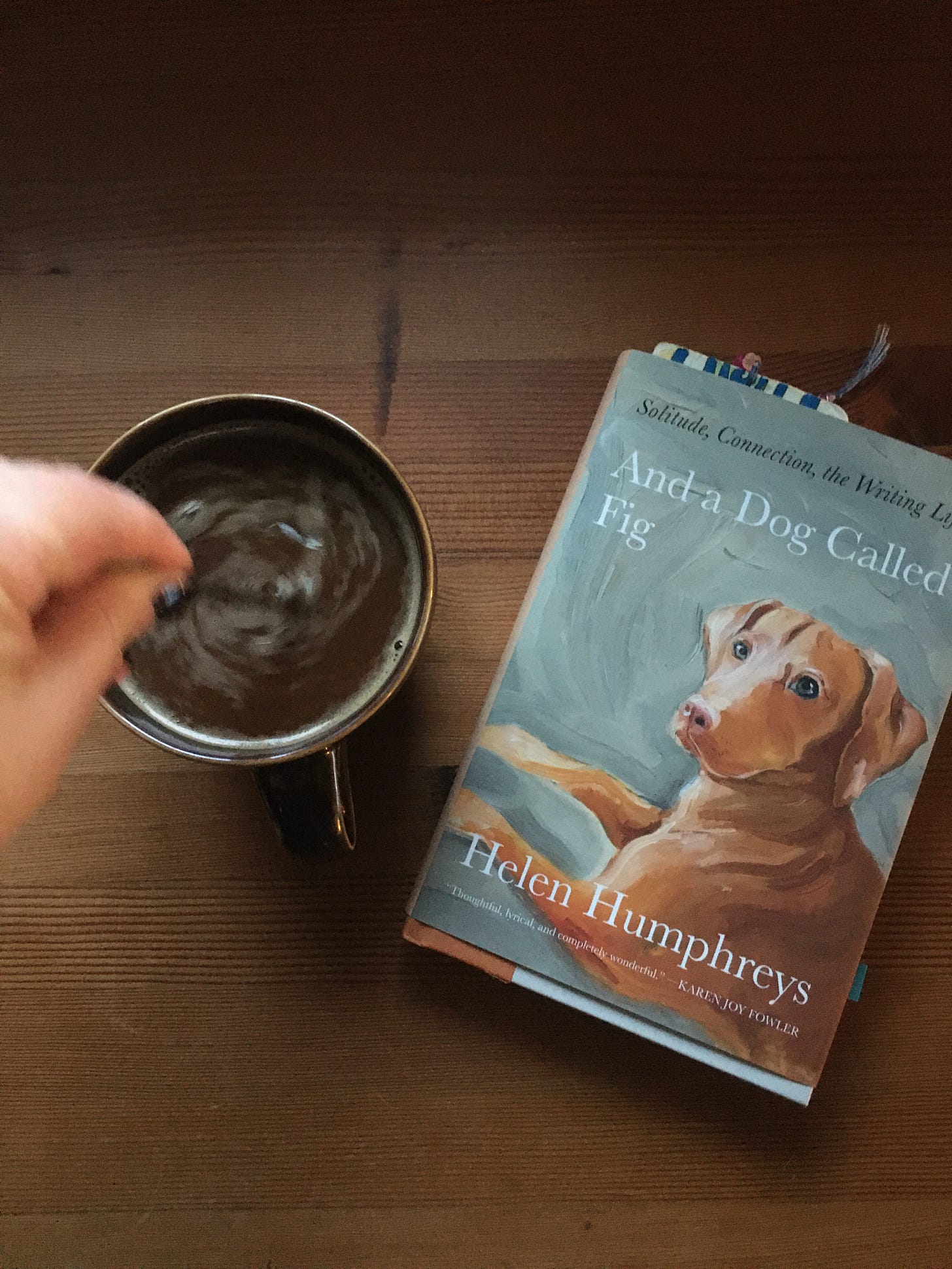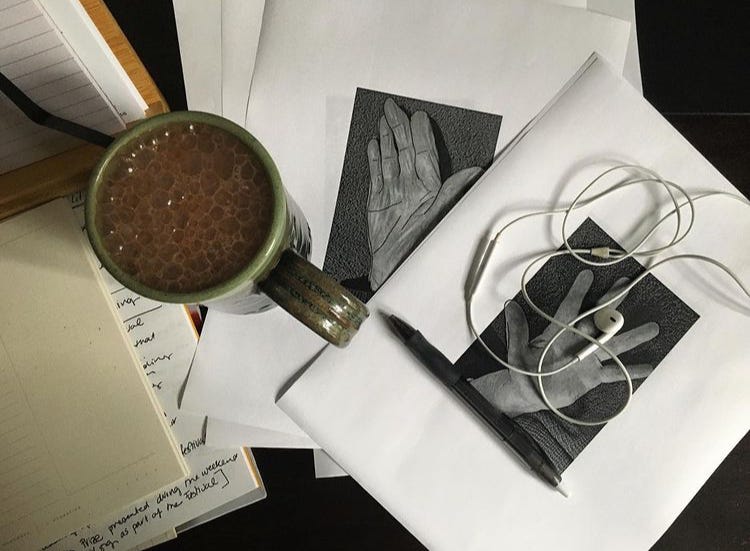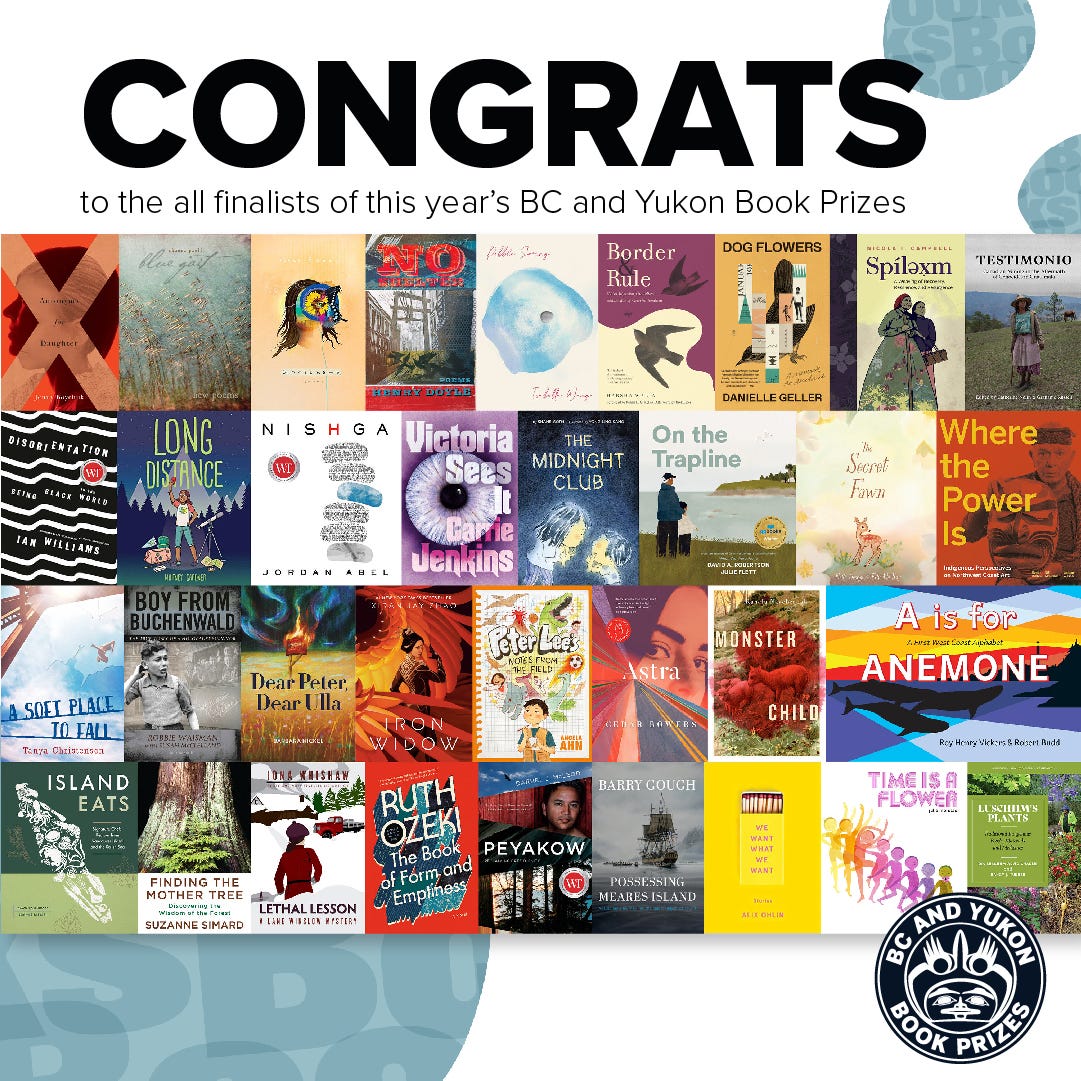I often wonder what it is about the books and writing that make their home in me. You know the ones I’m talking about? There are those books that you read and something about them comes alive and for the time you’re with that book, it becomes part of your life. These are those extra special books. There are a lot of great books, and amazing books, but the one’s I’m referring to are almost other worldly. And they aren’t the same for all of us. Maybe there’s a character that we connect with. There’s something in their voice or how they see the world that pulls us in. Or maybe it’s the story itself. It could be so unusual or so captivating that we just lose ourselves to the story.
I’ve recently been reading Helen Humphreys’ book And a Dog Called Fig. Helen Humphreys is one of those writers who writes those books I’m talking about. It’s been several years since I read Machine Without Horses and I still think about it and talk about it. In And a Dog Called Fig Helen writes about her relationship with dogs through her life and also the relationship of other writers to their dogs. She connects this relationship with creativity, specifically writing.
In the chapter titled “Process” Helen writes, “Perhaps one of the hardest things to learn about writing is that it is a continual process. Fixing words to a page doesn’t mean that they are permanent and inflexible. You haven’t arrived anywhere, even though it feels this way. For writing to have energy it has to remain energetic, and this means that it has to be able to move and change. After finally deciding on a train of though, a line of words, it is an effort to change direction.” I’ve been underlining many passages in the book as I read, but this one has been running through my head since the weekend.
One of the things I struggle most with my writing is how to know when a piece is done. For many years I was horrible at circling around an ending instead of landing on it. My friend and writing instructor Lorri Neilsen Glenn told me once that it’s like planes circling to land, or to borrow Helen Humphrey’s dogs, like a dog circling before the lay down in their bed. The endings plague me. And I don’t just mean the end of a book or an essay, I even mean the end of a section. I struggle with having the confidence for a piece to end the way it needs to instead of me forcing an ending on it. The writing often knows what it needs, if only we’d get out of its way. And I think this ties back to the energy that Helen refers to. We writers can often be heavy handed and forceful with our work. We want to be clever and brilliant. We want to stun our reader with our imagery and wow them with our prose. And this can often mean we become married to how we think it needs to be instead of how it should be.
I recently wrote six drafts of an essay (which is actually less than my average) and am working on revisions of my manuscript. I often think of work I submit to people, whether it’s an essay or my book, as being “done for now.” I know it’s not perfect, I know it’s not done, but it’s done for now and it’s still got a beating heart and a pulse that someone else will see. I know there’s still energy and movement in it, and editing is part of the process that will keep it alive and hopefully lead it to be one of those books or pieces of writing.
Exercise
One of the most important things we can do in a piece of narrative writing, whether it’s fiction or nonfiction, is to describe the setting. Setting includes everything from the physical space, to weather and time (the year/season etc.) But writing a setting that comes to life can be a challenge. Often it’s hard to think of descriptions that don’t seem cliched or overused. The trick is to see the setting through our character’s eyes. In Helen Humphrey’s book And a Dog Called Fig she writes about a park where she has walked many of her dogs: “Knowing this park as I do has made me think of how important setting is in a novel. Not so much what the setting is, but more what the characters know about it. What of a place is public, and what is private? What can be seen by everyone, and what is known only to a few people? My surroundings could be identical to my neighbour’s surroundings, but if we notice different things about them, or using them in different ways, then we are actually living in different places from one another.”
With these words from Helen in your mind, describe the space you’re in. What are the details you notice? What is your relationship to the space? Now, describe the space again, but this time imagine being your neighbour, or a friend who’s coming over for the first time. How would they respond to their setting? What would they see, smell, hear? Knowing these details and how we see our setting can be really useful when we’re trying to create a setting in our writing.
News
Last month I got some very exciting news: I have a literary agent! I’m delighted to be represented by the amazing Chelene Knight who is an agent at Transatlantic Agency. I’ve been lucky to get to know Chelene over the past few years. She’s taught poetry classes I’ve taken through the University of Toronto, and I’ve worked with her professionally in her role as the founder of Breathing Space Creative. And she’s also the author of books like Dear Current Occupant and her novel Junie will be published in fall 2022. I think I’ve also mentioned her in past newsletters. I’m excited to work with Chelene and already know she’s bringing such great ideas and feedback to my writing. For more information about the announcement click here.
I work as the Director of Programming and Communications for the BC and Yukon Book Prizes, and it’s been a busy and exciting few weeks as we prepared to announce the shortlists for the 2022 BC and Yukon Book Prizes. The shortlists were shared yesterday, and if you haven’t had a chance to look at them, you should! Some of the shortlisted titles include Ruth Ozeki’s The Book of Form and Emptiness, Darrel J. McLeod’s Peyakow and Time is a Flower by Julie Morstad. To see the full shortlists click here.
Events
On Saturday, April 23rd I’ll be talking to Frederick Blichert, author of Extra Salty: Jennifer’s Body, and Andrea Warner, author of Buffy Sainte-Marie: The Authorized Biography and We Oughta Know: How Four Women Ruled the ‘90s and Changed Canadian Music, about culture writing and cultural criticism. To register for this event with Frederick Blichert and Andrea Warner click here.
The Federation of BC Writers has announced the line-up for their 2022 Summit which will run online from May 14 to 20th. This year there will be workshops JJ Lee, Yasuko Thanh, Helen Humphreys, Chantal Gibson and more. I’m also doing a special Summit edition of Telling the Truth: Conversations about Creative Nonfiction with Danielle Geller, author of Dog Flowers, and Naomi Lewis, author of Tiny Lights for Travelers. Helen Humphreys and I will also be chatting about her work, writing, and probably dogs. For more information visit the Federation of BC Writers website here.
What I'm reading: I just started Wild Dogs by Helen Humphreys. I actually found a signed copy in a free library in town and while I was disappointed to find anti-vaccine propaganda stuffed in it, I was delighted when I saw it was autographed. Also while reading And a Dog Called Fig, Helen writes that Wild Dogs is one of her favourite novels that she’s written.
What’s next on the reading list: As I continue to prep for my events at the Federation of BC Writers Summit in May I’ve got a stack of other books by Helen Humphreys including her book Field Study: Meditations on a Year at the Herbarium which was published last year by ECW.
What I'm listening to: One of my favourite musicians, John Reis, formed a new band during the pandemic. I would listen to John Reis sing and play the Oscar Meyer wiener jingle, so yeah, I’m kind of a fan. He’s sang or played guitar in other bands like Rocket from the Crypt, Drive Like Jehu and Hot Snakes, and his new band is called Plosives. You can hear a song titled “Hit the Breaks” here.
What I'm watching: I’m still coming off the pure pleasure of the show Our Flag Means Death. This is such a lovely series and I hope there’s a season two. The show is about a Captain Stede Bonnet, the Gentleman Pirate (played by Rhys Darby aka Murray from Flight of the Conchords), who crosses paths with Blackbeard, played by Taika Waititi. If you haven’t watched it, you should! Currently I’m watching Traces, a Scottish crime drama which was recommended to me by another Shetland fan.
What I'm cooking: On the weekend I stocked up the freezer by making a couple chilis. I made a white chicken chili with lots of poblanos and white beans from The Pioneer Woman. And the other was the Best Vegan Chili from Julia Turshen’s Simply Julia. Given that it snowed off and on this afternoon it definitely feels like chili weather.









